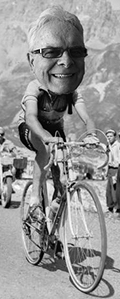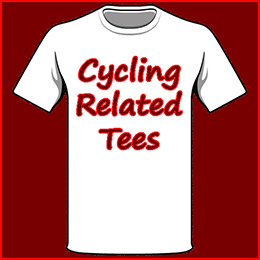You only know if you’ve been there, and done that
 Mon, July 28, 2008
Mon, July 28, 2008 An Article in the LA Times last Friday by Joel Stein, titled "Taking all the fun out of Cycling.” Subtitled “Why would you watch the Tour de France without the doped-up athletes?
It is satire, even though labeled "Opinion." Good satire, is so subtle that you don’t recognize it as such until you read the whole piece. The result was that many cycling fans got bent out of shape, and probably after reading half of the article, sent off angry comments.
I saw the article for what it was, however, I did pick up on this single sentence in the first paragraph where Stein said:
I've been following cycling since 1994 and have learned to appreciate the subtleties of team strategy, drafting, counterattacks and a 20-cyclist crash down a mountainside.
I doubt that. Joel Stein like many journalists probably doesn’t have an inkling what it takes to even compete in the Tour de France, let alone win. To know that you have to at least be a cyclist, and one that can ride a road bike at a certain level.
That would be, one who has reached at minimum a level fitness and expertise to ride in a pace line, following a wheel within a few inches. A person can read, or listen to experts commenting on the Tour de France, who will tell you how drafting behind someone you are using 15% less energy than the leading rider.
Sounds easy, but only those who have been in such a pace line with riders who are fitter, and far stronger than they are, really know just how difficult and physically painful this can be. To appreciate what an extreme endurance sport bicycle racing is, it has to be experienced at some level.
In the late 1960s I held a Category 1 Racing License in the UK. There were three categories at that time, and to become a Category 1, a rider had to win or place in a certain number of races, and maintain that level. Early in 1968, I went to France with two other riders from my club to compete in a weekend two-stage race.
This was my first and only trip to race on the Continent of Europe. It was both a revelation, and a humbling experience. One that quickly made me realize how far superior the racing cyclists were on the Continent at that time.
Saturday’s stage was a 100 km. event (62 miles.) held on a circuit barely five miles around. In England road race fields were limited to forty riders. (Sixty in some larger events.) In this event in France there were 120 riders riding on narrow country lanes barely 12 feet wide. This experience alone was overwhelming.
The pace was extremely fast right from the start; I kept expecting things to settle down after a short while, but the pace never relented. I found myself near the back of the peloton, and had enough experience to know this was not a good place to be.
With so many riders on roads this narrow there were very few gaps for a rider to squeeze through to move forward. It was a matter of, seeing an opening, sprint through, and then wait for the next opening. All this while riding at a pace that was only slightly less than my maximum speed.
It took me two complete laps of the circuit, about ten miles riding at maximum effort, just to get from the back to the front of the field. Once there I found one of my team members who told me the field had split, and about 30 or 40 riders were somewhere out in front and already out of sight on this twisting narrow circuit.
By this time I was so exhausted it was all I could do to maintain my position and finish the race. The next day’s stage was a 185 km. (115 miles.) road race over hilly terrain; I was determined to do better than the day before.
There was a break early on in the race, and I decided not to chase. The problem was I did not know the course or the other riders; I had no way of knowing if the break was significant or not. However, after about two thirds of the distance covered, when a chasing group of eight riders formed, I followed.
I think I rode harder that day than I had ever ridden in my entire cycling career, but I was out classed in every way. I finally blew up completely, was dropped, swallowed up by the peloton, now moving at a pace similar to the previous day’s event.
Like a dose of salts, I went through the bunch and out the back. Struggling along on my own just trying to finish, came the final humiliation. I was caught by a rider with a flat rear tubular tire, going bumpedy-bumpedy-bump along the road.
I worked with him for a while, but when we came to a significant climb, he rode away from me. Yes, with a flat tire. I realized that weekend, the only way to compete at this level, was to move to France and race and train with these riders on a regular basis. This was not an option for me as I was married with two small children.
I never went back to ride there again, there was no point. I was in my early thirties probably at the highest level of fitness I would attain. These were French amateur riders, holding down day jobs, and training in their spare time. I found it difficult comprehend the level of the European Professional Riders.
When I read something by a Los Angeles journalist who has probably never ridden a road bike say, “I understand the nuances of bicycle racing,” I have to say, “I’m sorry but you only think you know what cycle racing at the Tour de France level is all about.”
I have been trying to think of another sport that calls for maximum effort over and over during the course of a day's riding. Then the riders rise the following morning to do it again, and again for about four weeks. This is the Tour de France; there is no other endurance event like it.
 Dave Moulton | Comments Off |
Dave Moulton | Comments Off | 

















Reader Comments (8)
Very interesting personal perspective. One of your best.
I read Joel’s commentary as coming from a mainstream audience’s perspective; in other words not much experience, thus words that seem hollow. He is right on athletes using (and doing) things that would probably kill spectators, they always have. Having been a Cat 2 racer just before blood-boosting became popular, I had to constantly tell myself I can never do what the Continental racers (and club riders) were capable of. Of course, I still have to convince myself. Yet they inspire me; seeing them ride just once a year keeps me going for the rest, training for my own private Giro.
And that is what the regular public will never know.
Instead they only see what they are told to see, from pundits that want to “clean up” the sport. Good Luck in that.
I read your blog regularly and enjoy it. I enjoyed this post in particular because your story (which was great) helped me to "appreciate" the nature of riding in peloton. I tour and commute by bike, and I mountain bike recreationally, but have never raced. However, I have a whole lifetime of other experiences to draw from, if those feelings can be elicited through good writing. That is what good writing does. It allows us to "appreciate" things that we have not personally experienced. Although I have neve raced, I have experienced physical suffering. Great writers are able to use analogy and description to capture our imagination, and to help us to draw on our own experiences so that we can "appreciate" what others might have gone through. Just because I haven't experienced exactly what you have experienced, and you haven't experienced exactly what I have experienced doesn't mean we can't "appreciate" one another. That would be an arrogant assumption. Isn't that in part what your July 7 post was about? Rudely jumping to conclusions and making false assumptions based on limited information? You just jumped to the conclusion that Joel had "Probably never ridden a road bicycle" . Further, he didn't say, as you quoted "I understand the nuances of bicycle racing", he said he has "learned to appreciate . . .". There are many "nuances" to the word "appreciate". Your critique of Joel reminds me a little of a rap artist calling down a colleague for lacking street cred.
Dropped by a guy with a flat tire:) As someone who worked hard and enjoyed the thrill of being "pack fill", I can empathize with you. I really enjoy your blog Dave.
So true, so true...
Reading some of what the "specialised" media prints makes me laugh sometimes. It wouls be a great experiment to give Mr Stein a bike and sign him up for a Cat 4 race and see how much he has really learned over the years.
Your experience in France is really funny, sorry. You probably didn't think so at the time.
Regards,
AMR
It is simply impossible for me to imagine the total effort - mental and physical - to compete in and complete the Tour. I am astonished afresh every year. One of the things which bothered me about the "take back the tour" commercials was them showing Vino going backward into the starting gate, and Floyd smiling as he takes off the jersey. I doubt very much whether it was dope that got Vino to ride with a leg oozing pus and blood from a previous crash. Or newly injected testosterone that got Floyd up the mountain that day after bonking the day before. (testosterone doesn't act that quickly does it?)
It was their lion sized hearts, the hearts of champions.
I ride 4-5 days a week, heartbreaking climbs and big descents here in the Rockies. Being able to hold a line at 40-50mph on uneven, pebbly pavement is a not inconsiderable feat in itself. At Tour speeds? I'd be blubbering like an idjit!!
Follow that line of reasoning to its conclusion and you'd have to conclude that none of us should be able to comment on anything we haven't actually done ourselves. Surely that can't be right, can it?
Nick -- don't agree that the logical conclusion is that one can't comment on anything without having first done it. It's a matter of degree.
At the risk of stating the obvious ....
Race level riding is so different from just riding fast that it is difficult to understand the effort and skill it takes. And Tour de France level riding is exponentially more difficult to fully appreciate than ordinary race level riding because very few people ever come close to that level of athleticism or have the ability to overcome that kind of pain or the sheer terror of a blazing descent.
I watch and am in awe. I know it's difficult, but I know in my bones that I will never really know just how difficult it really is or experience anything remotely like what those riders experience.
Dave -- enjoying your book.